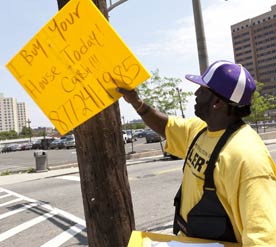We all know public housing needs radical transformation to survive. The system teeters on the verge of collapse: The 1.2 million units of public housing left need an estimated $30 billion in rehab and repairs. The federal government has failed to keep up with property maintenance and improvement for ages. Like their predecessors, neither the Obama administration nor the current Congress have been able to muster the political will to make investments that could start to address these problems.
The Obama administration is spending political capital on public housing, though, with PETRA. This is a welcome change from the past four presidents, who virtually ignored public housing except to pass policies that cut funding, criminalized residents, or demolished it altogether.
Unfortunately PETRA is in some ways as bad as what came before. Under it, PHAs could convert their public housing stock into project-based Section 8 units. Conversion would increase the subsidy PHAs get, allow them to leverage private capital to make repairs, and make it easier for them to sell their units to private developers.
The National People’s Action network will never accept a bill that transforms public housing to private ownership. Leveraging private capital could result in units being turned over to private lenders through default. Despite many requests, HUD officials have so far refused to add language to PETRA that would guarantee public housing remain publicly owned.
In the past, plenty of plans have come along from HUD and Congress full of good intentions for strengthening our public housing system and guaranteeing the basic human right to housing. But all too often the promise of improvement has led to systematic loss of units, loss of tenant rights, further disintegration of housing stock, and enrichment of private developers. This history has public housing residents across the country scared to death that they could lose their homes through PETRA.
We want to work with HUD and Congress to develop legislation that creates real opportunities to improve public housing. Currently we have nine points that must be included in PETRA or any proposal to convert public housing in order to gain our support:
All units, buildings and land must remain publicly owned, either by the PHA, a wholly owned subsidiary of the PHA, or by HUD itself.
Loans or investments that use publicly-owned land or buildings as collateral or as the underlying asset must not collectively indebt the property by more than 49 percent of the post-rehabilitation value.
Construction matching funds must be made available from an ongoing, congressionally funded public housing capital fund.
Loans made on converting buildings must only be FHA or other federal guaranteed loans to further ensure that the building or land cannot revert to any type of private ownership in case of default.
Specific standards in areas such as permanent loan modification rates, community investment and lending record, and lack of involvement in predatory credit (such as payday lending) must be met before a financial institution is allowed to provide financing for or profit from converted properties.
The use of the land and buildings — including any new units constructed on site or as replacement units — must remain permanently affordable.
There must be retroactive, one-for-one, like-for-like replacement of hard units. Whether a building is converting, undergoing substantial rehabilitation, or being demolished, those hard units must first be replaced in the community. Thousands of units have been lost through HOPE VI and other programs in the last 10 years. This is the time to get those units back.
All residents whose units are under consideration for conversion must be included in the planning and be a true part of the decision-making process.
All residents who are going through a conversion or an attendant rehabilitation of their unit must be assured that they have the right to return and that — during conversion or any other event — they will not face rescreening for eligibility to occupy their unit.
Our network represents thousands of public housing residents throughout the country, all of whom believe that PETRA could have devastating consequences on their communities. We all know that public housing needs radical transformation, but PETRA is most certainly not the answer.





Comments